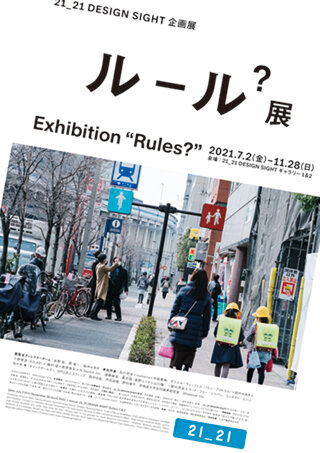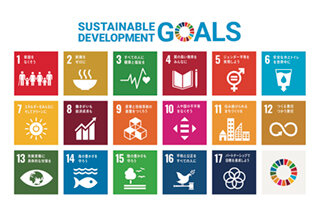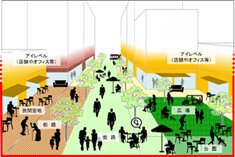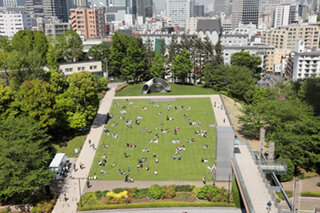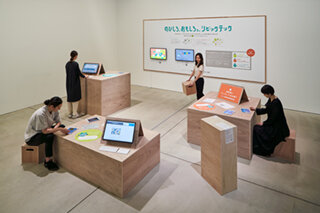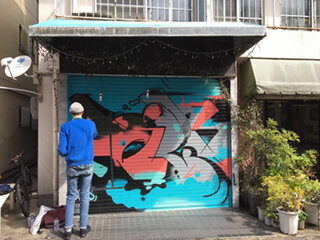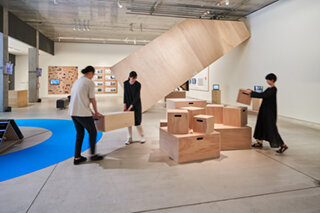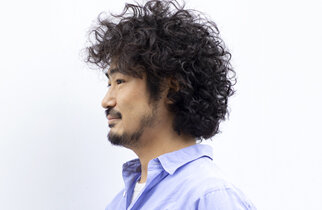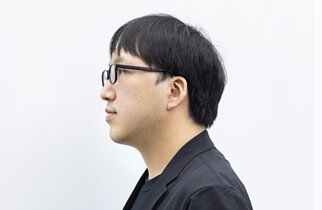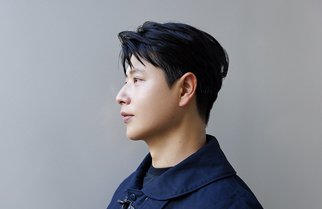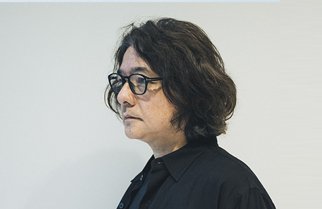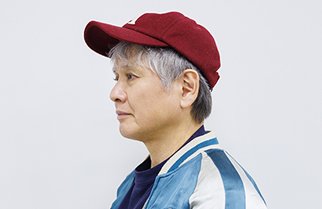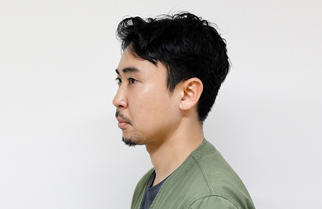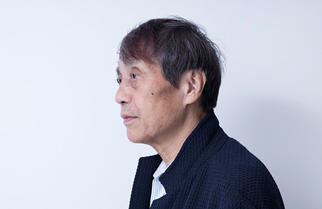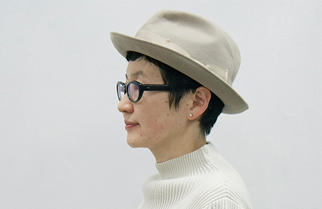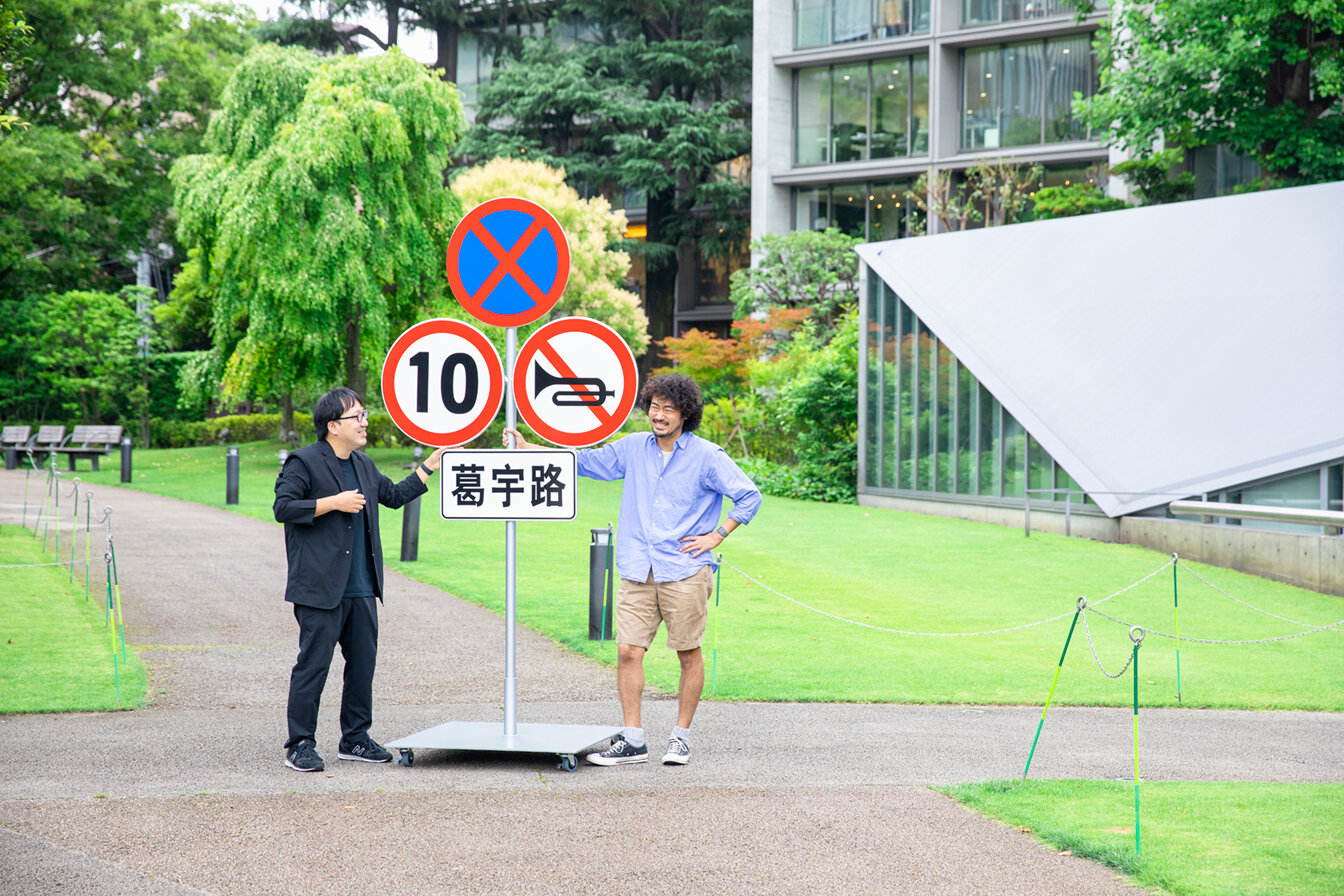
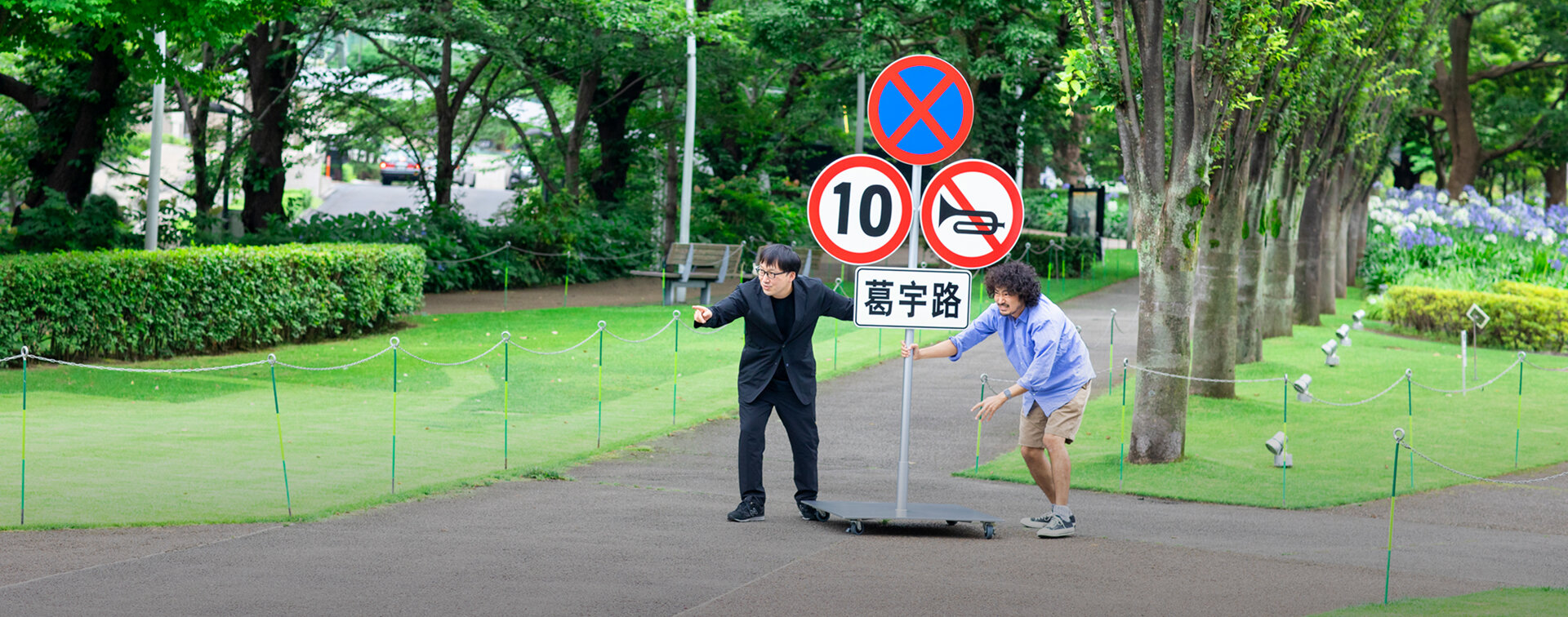
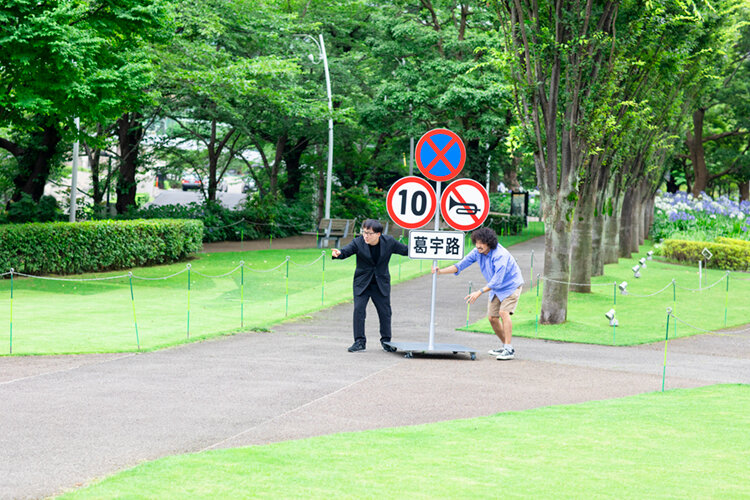
Rules: Jumping-Off Points for Creation
Mizuno-Creating "naturally emerging spots" with shutter art.
Suge-Interspersing cities with chairs encouraging proactive behavior.
"If there weren't all these regulations, I could have a lot more fun." "Rules interfere and keep things from going smoothly." Many people think of rules as a nuisance that hinders their actions, but are they really so bad? The exhibition "Rules?", currently being held at the 21_21 DESIGN SIGHT, attempts to present a new perspective on the various rules surrounding our daily lives. We asked lawyer Tasuku Mizuno and cognitive designer Syunichi Suge, members of the directorial team responsible for this elaborate exhibition, how viewing rules positively could change our lives and the city. It is an enlightening discussion about “rules.”
Why are rules so abhorred?
SugeFirst of all, when people think of design, they have a strong impression that it means creating something with shape, but the act of creating rules in itself can also be taken as a form of design. For example, you may place a no trespassing sign at a certain point which you do not want people to cross. In this case, you are not only designing the shape and position of the sign but also people's behavior by displaying a "no trespassing" rule. Hence, I believe rule creation and design are intimately related. If you look at it from a broader perspective, when you create something with shape you are also indirectly creating rules.
Moreover, things and actions are necessarily constrained, isn't it? For example, budgets and time may be limited, or only a specific set of things may be used. There is a tendency to view these restrictions negatively; however, when it comes to creation, it is because constraints are in place that dramatic ideas can be born. Restrictions, or putting it another way, rules, are an important jumping-off point for the creative process.
Through this exhibition, "Rules?", I hope we can change people's image about rules being something negative which impose restrictions on them to something they can design and use to positively rethink of and even reshape society itself.
Exhibition "Rules?"
The various rules surrounding our daily lives are greatly shifting due to changes in industry and social structure. This exhibition examines how the rules for coexistence in our future society can be shaped through design from multiple perspectives. Lawyer Tasuku Mizuno, cognitive designer Syunichi Suge, and curator Miyuki Tanaka serve as the exhibition's three-person directorial team and have combined their individual perspectives to present a new way of looking at, creating, and using rules. This is a participatory exhibition that explores the topic together with visitors. It is being held at 21_21 DESIGN SIGHT Galleries 1 and 2 until Sunday, November 28, 2021.
MizunoI am a lawyer, so my regular job is to deal with the law, which represents a set of clearly defined rules. In that sense, rules are a very familiar topic for me. So, whenever I think about society, I always wonder why everyone hates rules so much. Laws and rules are very important for controlling or restricting various human and corporate activities. Still, everyone tends to unnecessarily treat them as obstacles hindering their freedom. I feel it would be better to take them in a more positive light.
The exhibition "Rules?" intentionally deals with the topic of rules as an exhibition, and not as a literary work like a book or thesis. I want people interested in design and art to realize that they should enjoy rules because they are domain having vast scope for design. I want them to view rules with the awareness that if taken otherwise, it will be their loss.
More than anything, I want to convey that this perspective and mindset are necessary not only for those interested in design and art but for all members of society, especially in our current times. Since we are acting according to various rules without being aware of it, we should rather be able to improve the form of current rules to make them better or easier to use.
Your Rules and Society's Rules Should Be On a Par
SugeMany people naturally set small rules like their waking up time, but tend to treat somewhat bigger rules differently.
MizunoThat's true. If people didn't set a time to get up, they would probably sleep in and idle around in bed. By setting rules, they can act in a systematic way. To put it on a larger scale, creating an index like the SDGs is also a way of setting an agenda for something to strive towards. There are actually many situations in which rules are used positively.
SDGs
The Sustainable Development Goals (SDGs) are a set of goals across 17 areas to be achieved by 2030. Jakob Trollbäck, a creative director from Sweden, built a design system to represent the goals with realistic wording, clear icons, and eye-catching color-coding.
SugeWhen it comes to society, we think of it as something burdensome or rigid, something that can't be altered, which causes us to unconsciously make a distinction between our personal rules and those of society. We want to understand why in order to bridge such gap. If we can realize that both are rules after all, and therefore, the same thing, the way we relate to society will change a little.

Designing Updatable Rules
SugeMan-made rules, that is, rules someone made with a purpose in mind, should be updated if they don't work as envisioned. But, I feel there is an embedded assumption that they should not be changed once made. We readily change the rules we have made for ourselves as we see fit. For example, we may choose to set our waking up time a little earlier if we are always about to run late. I think it is important to be actively involved with bigger rules, considering them as updatable. After all, that is also what design is all about, isn't it?
MizunoI believe people have the impression that rules governing cities, especially laws, cannot be easily changed. However, an example of a major change of rules in the last five years has been related to the utilization of public spaces. The Ministry of Land, Infrastructure, Transport and Tourism (MLIT) has been listening to the voices of local communities and revising laws and regulations regarding the utilization of riverbeds, roads, parks, etc. If we observe that process closely, we will realize that rules are, after all, subject to change.
Looking at the "Street Design Guidelines" published by the MLIT, we can see in a broad sense that, contrary to our expectations, rules for urban development are changing. The national government and administration are more sensitive to community voices than we would think. On the other hand, there are many rules that have not changed. For example, there has been much discussion about the utilization of public spaces, with no updates so far. Midtown Garden, where the 21_21 DESIGN SIGHT is located, is a typical example of effective use. However, there are still numerous vacant spaces left unused or without attracting enough visitors and businesses. So, even from a rule-based perspective, there are still many urban spaces where design could be constructively applied.
Street Design Guidelines
Targeting areas that are within walking distances, these guidelines formulated in March 2020 by the Ministry of Land, Infrastructure, Transport and Tourism, outline key ideas for future street design that will support walkable cities. The guidelines bring together many opinions from the Street Design Roundtable launched in 2019, including from academics and local governments, and present key ideas for street design along with various examples.
Image: Courtesy of the MLIT website
Open Public Spaces
Based on the comprehensive design system that was established in 1971, this type of open spaces are found within the grounds of building and condominium sites and are open to the public for free passage and use. By creating such open spaces, building floor area ratios can be increased and height restrictions can be relaxed. At Tokyo Midtown, about four hectares of land, including the adjacent Minato City's municipal Hinokicho Park, have been designated open public spaces. The photo shows the Grass Square in Midtown Garden.
SugeI suppose if people stayed and congregated there would be business, hustle and bustle, but presently all possible efforts are being made to prevent this from happening anywhere. In other words, the city has simply become a passageway for going from one destination to another. This is fine for places which are a hub for a variety of destinations, but nothing else can really happen at places that are only for passing by. I think what we need right now is a way to have people stay and congregate in open spaces of the city.
Keep Asking What Rules Are For
MizunoConversely, some rules do not need to be updated. In particular, rules dealing with architecture and roads, since they are often related to safeguarding human life; so, naturally, not all rules need to be revised.
SugeI think it is important to create a situation where you can immediately change rules in case of a contingency. I want to assume that anything may change in the future and that rules can also be changed. Rules in particular are often viewed as something that has been decided and are thus inalterable. So, I think it would be better to first make their changeability become a common assumption. For example, it used to be considered rude to talk to someone while wearing a facemask. However, COVID-19 easily changed that. As values can change fluidly depending on various factors, so rules should also adapt accordingly. Especially in cities, as people change, so do the way things are and look like.
MizunoWhen they are fixed, rules stop people from thinking. If flexibility and fluidity are not ensured along with a perspective to review them periodically, rules will stagnate. This is probably one of the roots of the problems occurring in Japan today. As a lawyer, it is important to go back to the "purpose" of a law, one step beyond the interpretation of the wording, to understand why a law was enacted the way it was. This may be in the process of becoming a widely sought-after perspective in today's world. I would like people to start by carefully thinking about why any given rule exists.
SugeAs a result of the maturation of society, today's rules have become fossilized and stagnant, and the reasons they were made are being forgotten. To reverse this situation, I think it is necessary to review the rules on an individual level, by repeatedly asking ourselves, "Why was this rule created in the first place?" That is a hassle, but continuing to carefully undertake steady actions, one thing at a time, will ultimately serve as a shortcut for updating society.
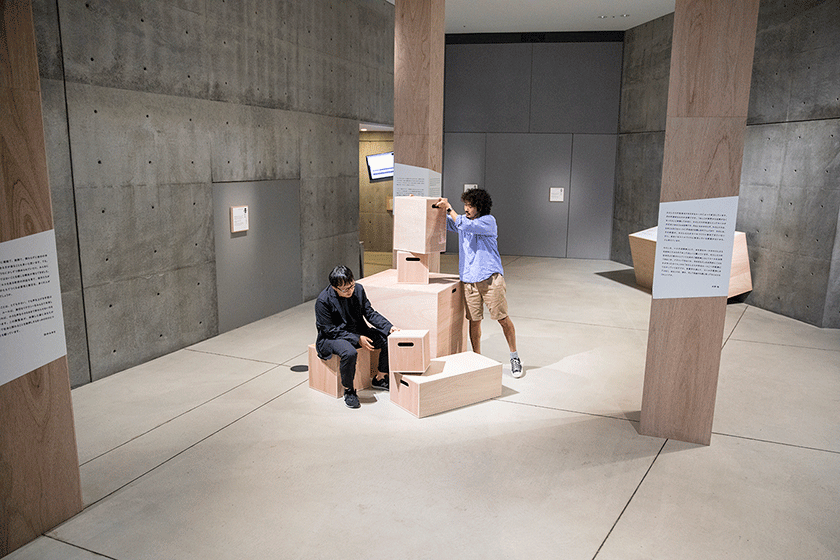
Rules Are More Fun if You Get Involved and Participate
SugeIn order to question the existing rules, it might be a good idea to make your own rules and involve people in them. For example, it could be a small rule among family members; let's put these things here when we come home. When making rules, you have a responsibility to explain why you need it, correct? To some extent, it is hard and takes a lot of courage to ask others to follow the rules you have created, but we need to get used to that. If we can have a similar approach to other rules we follow, then I feel we can move one step ahead.
MizunoThe kind of people who, from the very outset, tend to show interest in an exhibition delving on the abstract and conceptual topic of rules, usually are a very limited group of the "intelligentsia." The exhibition "Rules?" that we have planned is not about knowledge of rules, but rather, it is a hands-on experience aimed at getting people to naturally think it might be more fun to get involved with rules and proactively participate in their making.
SugeIt's possible that people who come to the exhibition will change other people's behavior. I also teach at a university, and always think one cannot change the world alone. That's why I place great importance on how to increase the number of like-minded people. For example, I think of the students I teach as like-minded people. In the same way, with this "Rules?" exhibition, I think visitors who find it interesting can also become like-minded people. Ideally, by increasing the number of such like-minded individuals, the number of people who will find it interesting to change rules will gradually increase.
Is an Ideal Society One in Which There Is Constant and Active Discussion Irrespective of the Outcome?
MizunoI believe if all worked together to update the rules, more and more people would feel that this town, this city, or this country is their own. For instance, those living or working in Roppongi, could come to feel that they are a part of the town or are actively participating in it.
Conversely, we feel distant from systems and laws in the first place because we do not fully trust the country or the city we live in. I am also the same way. I think the reason we don't trust them is because we feel that someone else in some unknown place is deciding the rules and systems and imposing them on us. Given that people do not feel involved in their design, I think perceptions might change if they felt involved in creating the rules and their systems, even if just a little. This is slightly different from creating your own ideal city, as your opinions and desires may not be adopted. Even so, I think being involved in such exchanges is an important factor.
SugeAny one ideal state is only ideal for some, and other people's ideals are probably different. That is only natural. There are many different people in a city, each with their own ideals, and they may have conflicting values. Thus, when you try implementing rules, some will not work out well. I think the more we try to fix rules immediately when they don't work out, the more opportunities for discussion will be there.
The ideal may seem like having a clear goal; however, to have relationships where constant discussions happen is more important. Ideal values change with the times; thus, the design of social systems depends on whether we can sustain a state of flow rather than one of stagnation.
MizunoIn the "Rules?" exhibition, there is an exhibit called "Growing, Exciting, Civic Tech," produced by the organization Code for Japan. It uses Decidim, a digital platform that was arranged for this exhibition allowing citizens to participate in politics, by letting anyone express their opinion on the agenda. It would be great if interactions allowing people to easily participate in urban development and rulemaking using the current technology could become more widespread.
Growing, Exciting, Civic Tech
Created by participants from Code for Japan, a civic tech (citizen-driven approach to solving social issues and local problems) community. The exhibit introduces the Civic Tech movement, its technologies and methods, by asking "Is it possible to take the city and its rules as our own and create them with our own hands?" Here, visitors will experience the participatory democracy debate process using the digital platform Decidim.
Code for Japan' s Growing, Exciting, Civic Tech Photo: Masaya Yoshimura
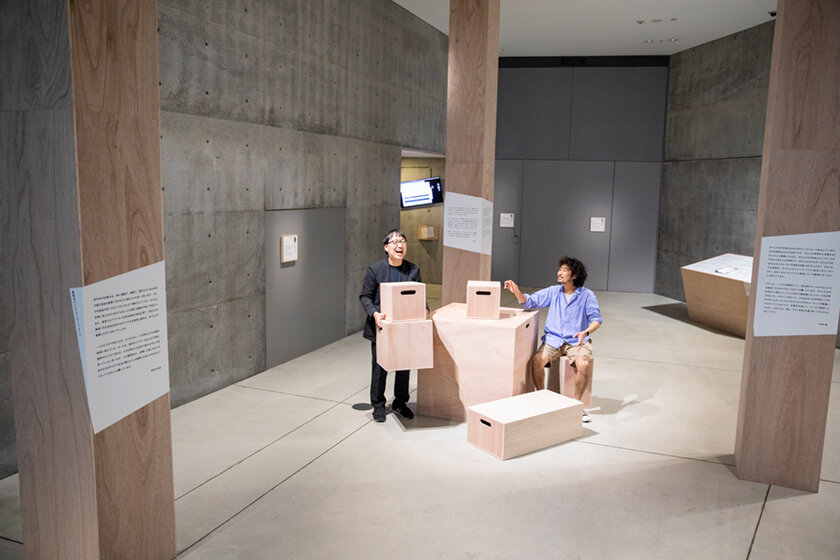
Increase the Number of Naturally Emerging Spots in the City That Are Not Landmarks
MizunoLegal Shutter Tokyo is exhibiting at "Rules?". This organization started as a project aiming to have overseas graffiti artists paint graffiti on store shutters in Tokyo when they visited Japan. In looking at the graffiti environment in Japan, I feel frustrated because discussions tend to stop at the legal-illegal divide, or at the idea that graffiti culture can take root overseas because regulations are loose, but not in Japan because they are strict.
Legal Shutter Tokyo
Operated by the artist collective SIDE CORE, this project seeks to match Japanese and overseas graffiti artists with Japanese store shutters where they can display their work. Going beyond the legal-illegal divide, the project attempts to have graffiti accepted as a new culture in a uniquely Japanese context, different from overseas graffiti. The project aims to bring color, liveliness, and interaction to shutters and neighborhoods that would otherwise tend to be dull and tasteless.
Image: Courtesy of the Legal Shutter Tokyo website
https://legalshuttertokyo.tumblr.com/
There was a time when a project known as Legal Wall gained popularity in Shibuya and elsewhere. The point was to legally provide a place for graffiti, but some graffiti artists think it's not cool to do it legally. And some see it as a project capitalizing on the graffiti culture and oppose the idea of its exploitation. So even among the artists, there is a split between those in favor and those against the concept.
Against such a backdrop, Legal Shutter Tokyo has brought graffiti to shop shutters, a uniquely Japanese landscape, and by institutionalizing the consent system, it has created room for graffiti being accepted as a new culture that fits the Japanese context. Thus, by creating our own rules, we can open a conduit for things to move in the right direction. I think this project embodies the attractiveness of rules in a good way, and I would like to see it developed in Roppongi as well. It is also an interesting means for urban development.
SugeIt seems like a way to increase the number of "naturally emerging spots," different in form from landmarks.
MizunoExactly! Since the shops themselves are still basically in use, the shutters are raised during the day, and a completely different landscape unfolds. It's different from public art, as it blends into everyday life.
Anything That Goes Beyond Rules Has the Power to Regenerate
SugeTaku Satoh, the director of 21_21 DESIGN SIGHT, often talks about "making the known unknown," meaning to look at what you already know from a new perspective. This is important in design, and I think it holds true for cities as well. When a store is not open for business, its shutters are closed, so if you want to see graffiti, you will have to visit at a different time than usual. When you do that, you will see the charm of the city and the appeal of the neighborhoods in a light different from what you are used to. The things you notice will change, so there is a feeling that something interesting might happen.
I would like to have chairs that can be moved about like the ones in the lobby of this exhibition hall scattered about the city. By doing so, I would like to change people's walking and moving rhythms. If people stop at places where most passersby would simply traverse on the way to their destinations, they will start seeing and noticing many things. If there are chairs that can be moved around in such places, people will be able to actively devise ways to enjoy the city. They could move one of the chairs to their favorite spot and sit and relax, or line some up in a row to form a bench. I think if such movement is encouraged in a variety of ways, it will lead to a proactive involvement with the city.
Boxes at the "Rules?" Exhibition
The boxes in the galleries and the B1F lobby of the venue can be moved about and placed anywhere in the venue. They can be used as chairs, footstools, or any other use the visitor can think of.
"Rules?" Exhibition venue scene Photo: Masaya Yoshimura
MizunoThis exhibition deals with the topic of not only noticing, using, and obeying rules but also breaking and violating them. It is a perspective that gives importance to the ability to hack the rules to update them, which in turn gives way to the creativity and dynamism for building a new era.
SugeOnce you can discover new possibilities by successfully using and then breaking a rule, it will become the next rule and lead to changes of what society takes for granted.
MizunoI think it is important for society to incorporate the hacked parts and update rules to improve them. Also, I believe that people with an active role in society are skilled in a certain way in discovering implicit rules. It should be easier to do some things precisely because there are rules. At the same time, by deviating from the rules, you can do new things. In that sense, I think many talented businesspeople and creators efficiently use and hack rules accordingly.
SugeThe fact that something has already been decided means that nothing beyond that has been done. Thus, anything that successfully has gone beyond the rules has the power to become something new, right?
Photo location: The "Rules?" exhibition at the 21_21 DESIGN SIGHT (Currently underway until November 28, 2021)
Editor's Thoughts
Feeling lack of freedom because of the COVID-19 pandemic and that our lives are becoming increasingly burdened by rules, many parts of this interview with its timely topic resonated with me. The more I listened, the more I felt that those actively involved in creating rules are the winners. As for myself, I would first like to start by reexamining the rules I take for granted. The exhibition "Rules?", which leverages the individuality and strengths of each member of the directorial team, is a unique exhibition that allows visitors to feel they are participating by experiencing rules firsthand while appreciating the works on exhibit and being aware of the existence of others.
(text_ikuko hyodo)




